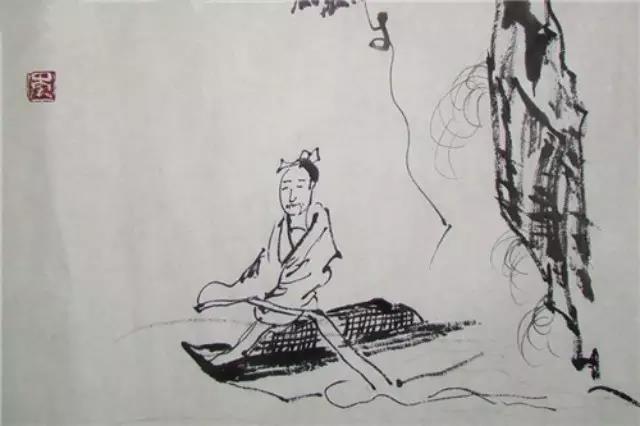
翻译赏析:钱钟书《论文人》
论文人
On Men of Letters
钱钟书
Qian Zhongshu
文人是可嘉奖的,因为他虚心,知道上进,并不拿身分,并不安本分。真的,文人对于自己,有时比旁人对于他还看得轻贱;他只恨自己是个文人,并且不惜费话、费力、费时、费纸来证明他不愿意做文人,不满意做文人。在这个年头儿,这还算不得识时物的俊杰么?
Men of letters deserve recognition for their humility, their unpretentiousness, their dissatisfaction with what they have ended up doing, and their desire for upward mobility. These poor souls love belittling themselves, often in excess of what others would say of them. They bemoan their fate, and would go out of way to devote long orations or copious ink to declaring that they are unwilling and unhappy to be men of letters. In this day and age, such traits should be sufficient proof that these are exceptionally talented individuals who truly understand the world.
所谓文人也者,照理应该指一切投稿、著书、写文章的人说。但是,在事实上,文人一个名词的应用只限于诗歌、散文、小说、戏曲之类的作者,古人所谓“词章家”、“无用文人”、“一为文人,便无足观”的就是。至于不事虚文,精通实学的社会科学与自然科学等专家,尽管也洋洋洒洒发表着大文章,断乎不屑以无用文人自居——虽然还够不上武人的资格。
If used appropriately, the term, men of letters, should cover all those who write articles or books. In practice, however, that title seems to be reserved only for poets, essayists, dramatists and the like, that is, those who were referred to by ancients as trifling, pitiable, and worthless literary men. While also writing for publication, scholars in social and natural sciences, who presumably engage in practical research and learning, do not condescend to call themselves “men of letters”, though they obviously are not yet on par with men-at-arms.
不以文人自居呢,也许出于自知之明;因为白纸上写黑字,未必就算得文章。讲到有用,大概可分两种。
Maybe it is wise to refrain from assuming such a title, because the act of writing does not automatically lend itself to practicing the art reserved for men of letters. Any discussion about usefulness would usually center on two kinds of things.
第一种是废物利用,譬如牛粪可当柴烧,又象陶侃所谓竹头木屑皆有用。
Firstly there is waste that can be reused, such as cow dung as a fuel. We know that seemingly worthless things like bamboo scraps and wood chips could be put to use, as Tao Kan, a military commander in ancient China, rightly put it.
第二种是必需日用,譬如我们对于牙刷、毛厕之类,也大有王子猷看竹“不可一日无此君”之想。
Secondly, there are daily necessities, such as tooth brushes or toilets, things we cannot do without even for a day. Man’s need for what is absolutely indispensable was famously highlighted by Wang Ziyou, an eccentric bamboo lover, when he described his emotional affinity towards bamboo plants.
天下事物用途如此之多,偏有文人们还顶着无用的徽号,对着竹头、木屑、牙刷、毛厕,自叹不如,你说可怜不可怜?
Everything under the sun seems to serve some purposes, leaving men of letters alone donning the label of good-for-nothing fellows. Conceding their relative inferiority to bamboo scraps, wood chips, tooth brushes or toilets, they find themselves under a self-pitying spell.
对于有用人物,我们不妨也给予一个名目,以便和文人分别。譬如说,称他们为“用人”。“用人”二字,是“有用人物”的缩写,洽对得过文人两字。这样简洁混成的名词,不该让老妈子、小丫头、包车夫们专有。并且,这个名词还有两个好处。
We might as well give a name to those whose work is deemed useful, so that they would not be lumped alongside men of letters. They could be called “servants”, which is in fact a shortened form of “service providers”. Such a concisely coined title should not succumb to the monopoly of housekeepers, maids, and rickshaw pullers. Besides, there are two distinct advantages to using this term.
第一,它充满了民主的平等精神,专家顾问跟听差仆役们共顶一个头衔,站在一条线上。
First, it is imbued with the spirit of democracy and equality, placing attendants and butlers on an equal footing with experts and consultants, by addressing them in the same manner.
第二,它不违背中国全盘西化的原则:美国有位总统听说自称为“国民公仆”,就是大家使唤得的用人;罗马教皇自谦为“奴才的奴才”或“用人的用人”(Servusservorum);法国大革命时,党人都赶着仆人叫“用人兄弟”(Frèresser vants);总统等于君,教皇(Pope)等于父(Papa),在欧美都和用人连带称呼,中国当然效法。
Second, it does not run counter to China’s wholesale Westernization. We are told that an American president once called himself “a servant of the people”, or in other words answerable to the people. The Pope used to humbly refer to himself as “a servant of servants” (servus servorum). The French revolutionary partisans called their followers “brother servants” (frères servants). Since in the West the title “servant” is bestowed upon the president of a country, who enjoys the status of a sovereign in international relations, and upon the Pope, the leader of Catholics worldwide, there seems no reason China should not follow suit.
用人瞧不起文人,自古已然,并非今天朝报的新闻。例如《汉高祖本记》载帝不好文学,《陆贾列传》更借高祖自己的话来说明:“乃公马上得天下,安事诗书?”
The fact that servants look down upon men of letters is not today’s news; it dates back to antiquity. Emperor Liu Bang (256-195 BC), for example, was no fan of literature, according to his biographer. The emperor was quoted in the Biography of Lu Jia as saying, “I conquered the world on horseback, and had no time for poetry and prose.”
直捷痛快,名言至理,不愧是开国皇帝的圣旨。从古到今反对文学的人,千言万语,归根还不过是这两句话。“居马上”那两句,在抗战时期读来,更觉得亲切有味。
This is the truth, and nothing but the truth, which has even been validated by an imperial edict, and which aptly summarizes the central arguments of the abundant anti-literature discourse since ancient times. Mention of “horseback” was all the more relevant and meaningful to readers during the Anti-Japanese War.
柏拉图的《理想国》里排斥诗人文人,哪有这样斩截雄壮的口气?柏拉图富有诗情,汉高祖曾发诗兴,吟过《大风歌》,他们两位尚且鄙弃词章,更何况那些庸俗得健全的灵长动物。
For his part, Plato banishes poets and artists from his city in The Republic with majestic eloquence and unshaken resolve. Since even Plato, who was poetically endowed, and Emperor Liu Bang, an occasional poet himself and the author of “Song of the Wind”, disdained literary works, little wonder, then, that those worldly wretches who smugly represent the epitome of vulgarity would mount a frontal assault on art.
戈蒂埃(Theophile Gautier)在《奇人志》(Les Grotesques)里曾说,商人财主,常害奇病,名曰“畏诗症”(Posophobie)。病原如是:财主偶尔打开儿子的书桌抽屉,看见一堆写满了字的白纸,既非簿记,又非账目,每行第一字大写,末一字不到底,细加研究,知是诗稿,因此怒冲脑顶,气破胸脯,深恨家门不幸,出此不肖逆子,神经顿成变态。
Theophile Gautier tells a story in Les Grotesques about a wealthy businessman suffering from a bizarre aliment called “metrophobia” or fear of poetry. The man’s medical condition was triggered by his discovery in his son’s desk drawer a pile of pieces of paper, which he found out were not book-keeping or accounting records, with each line starting with a capital letter and without a single line running all the way to the right end. Realizing that they were in fact manuscripts of poems on close examination, he flew into a burning rage, which tore at his lungs, plucked at his nerves, and twisted his mind, tortured by the thought that it was a tragic misfortune to have such a good-for-nothing son.
其时此症不但来源奇特,并且富有传染性;每到这个年头儿,竟能跟夏天的霍乱、冬天的感冒同样流行。
Not only is this disease strange in the way it is contracted, it is also highly infectious. It has nowadays even become a seasonal epidemic, just like an outbreak of cholera in the summer or influenza in the winter.
药方呢,听说也有一个:把古今中外诗文集都付之一炬,化灰吞服。据云只要如法炮制,自然胸中气消,眼中钉拔,而且从此国强民泰,政治修明,武运昌盛!至于当代名人与此相同的弘论,则早已在销行极广的大刊物上发表,人人熟读,不必赘述。
Then what arsenal do we possess to combat the onslaught of such a scourge? A silver bullet can, it is said, be found by committing to flames all publications of poetry and prose, ancient and modern, domestic and foreign, and letting the disease sufferers swallow the ashes. As long as this prescription is dutifully followed, our broken hearts could be healed, and the thorn in our flesh could be removed – it is claimed. We would be blessed with prosperity, peace, and political stability, buttressed by invincible military might. On this score there seems no need to quote from great minds of the modern age, who have also offered well-informed advice, which has appeared in publications with the largest circulation, and is known to all.
文学必须毁灭,而文人却不妨奖励——奖励他们不要作文人。蒲伯(Pope)出口成章(Lispinnumbers),白居易生识之无,此类不可救药的先天文人毕竟是少数。至于一般文人,老实说,对于文学并不爱好,并无擅长。
While literature is to be doomed, men of letters might as well be rewarded – for deserting their profession. After all, few are hopelessly endowed with an extraordinary literary faculty, though we might count in Alexander Pope, who was naturally at ease with metrical verse (lisp’d in numbers – as he himself claimed), and Bai Juyi, who also appeared innately talented with poetry. Men of letters in general, however, have neither a proclivity nor a special flair for literature, if we let the truth be told.
他们弄文学,仿佛旧小说里的良家女子做娼妓,据说是出于不甚得已,无可奈何。只要有机会让他们跳出火坑,此等可造之才无不废书投笔,改行从良。文学是倒霉晦气的事业,出息最少,邻近着饥寒,附带了疾病。
Their clumsy attempts at literary creation are made in the same manner as girls from morally strong families turn to prostitution – out of necessity rather than inspired by their inner muses. Once given a chance to escape what is perceive as an inferno where they find themselves trapped, they could not wait to abandon their old despicable trade and turn a new leaf. Drudgery in literature is a miserable and unpromising career anyway, which often leads to hunger, accompanied by illness.
我们只听说有文丐;像理丐、工丐、法丐、商丐等名目是从来没有的。至傻极笨的人,若非无路可走,断不肯搞什么诗歌小说。因此不仅旁人鄙夷文学和文学家,就是文人自己也填满了自悲心结,对于文学,全然缺乏信仰和爱敬。
There are literary beggars, to be sure, but not a single one could be associated with science, engineering, law, or business. Those who are unfortunately deprived of any real talent would not take up writing poetry or novels if they have some other way out. As a result, not only are literature and its creators despised by others outside the profession, but even men of letters themselves, who are invariably consumed by an inferiority complex, have neither confidence in nor love for their work.
譬如十足文人的扬雄在《法言》里就说:“雕虫篆刻,壮夫不为。”可见他宁做壮丁,不做文人。因此,我们看见一个特殊现象:一切学者无不威风凛凛,神气活现,对于自己所学科目,带吹带唱,具有十二分信念;只有文人们怀着鬼胎,赔了笑脸,抱愧无穷,即使偶尔吹牛,谈谈“国难文学”、“宣传武器”等等,也好像水浸湿的皮鼓,敲擂不响。
A literary master named Yang Xiong, for example, declares in his Exemplary Sayings, “Men of strength do not stoop to petty craftsmanship.” It could be deduced from this assertion that he would rather be an able-bodied conscript than a literary figure. We are now confronted with a weird reality: while scholars of all stripes are overflowing with confidence in their academic pursuits, and have no qualms about blowing their own horns in unabashed displays of hubris, only pitiable literary men have to fake their smiles, apologetic and tormented by their guilty conscience. Even when they do have the occasional luxury of talking big, touching upon issues of national importance, such as the role of literature in resisting foreign invasion or championing worthy causes, they preach in a husky and feeble voice, very much like a broken drum.
歌德不作爱国诗歌,遭人唾骂,因在《语录》(Gespracechemit Eckermann)里大发牢骚,说不是军士,未到前线,怎能坐在书房里呐喊做战歌。(Kriegs liederschrei benundinZimmersiteenl)。
Reviled for staying clear of writing patriotic poetry, Goethe gives vent to his frustration in Conversations with Eckermann (Gespräche mit Eckermann) by asking rhetorically: How can you write battle songs in your study without being a warrior on the frontline?
少数文人在善造英雄的时势底下,能谈战略,能做政论,能上条陈,再不然能自认导师,劝告民众。
In times of turmoil and changes that are often accompanied by the emergence of great men, a few men of letters would burst upon the scene as movers and shakers by expounding strategic choices, presenting political analysis, offering advisory opinions to men in power, or at least becoming self-appointed advisors to the populace.
这样多才多艺的人,是不该在文学里埋没的。只要有机会让他们变换,他们可以立刻抛弃文艺,别干营生。
These men of many talents should not simply seal their fate with a hapless journey in literature that is taking them nowhere. They would jump at any chance to be redeemed by extracting themselves from the literary dungeon and embracing a new career.
雪莱在《诗的辩护》里说文人是“人类的立法者”(legislator),卡莱尔在《英雄崇拜论》里说文人算得上“英雄”。那些特殊材料的文人只想充当英雄,希望变成立法者或其他。竟自称是英雄或立法者,不免夸大狂;想做立法者和英雄呢,那就是有志上进了。有志上进是该嘉奖的。有志上进,表示对于现实地位的不满足和羞耻。知耻近乎勇。勇是该鼓励的,何况在这个时期?
Percy Bysshe Shelly exalts men of letters as “legislators of the world” in his “A Defence of Poetry”. Thomas Carlyle calls them “heroes” in his On Heroes, Hero-Worship, and the Heroic in History. A singular goal pursued by men of letters of no ordinary caliber is, as always, to be heroes, legislators or other influential figures. While it is true that self-labelling as heroes or legislators may smack of narcissistic personality disorder, the desire to be one is surely laudable, as it demonstrates their motivation to move up, a longing for leaving where their fate has cast them and where they find themselves reeling from frustration and shame. Knowing shame is akin to courage, and courage is what should be promoted, especially at this historical juncture.
要而言之:我们应当毁灭文学而奖励文人——奖励他们不做文人,不搞文学。
In a word, we should all ring the death knell for literature, but reward men of letters – for ditching their career and renouncing literature.
(蔡力坚 译)
推荐阅读





